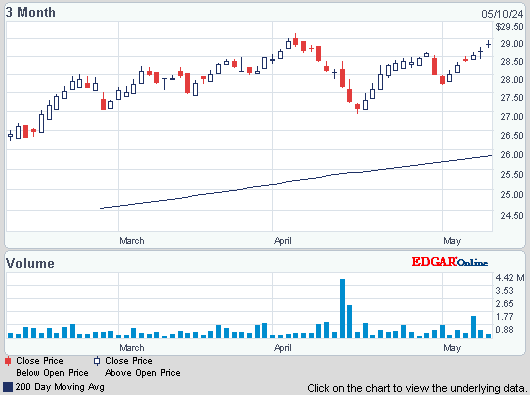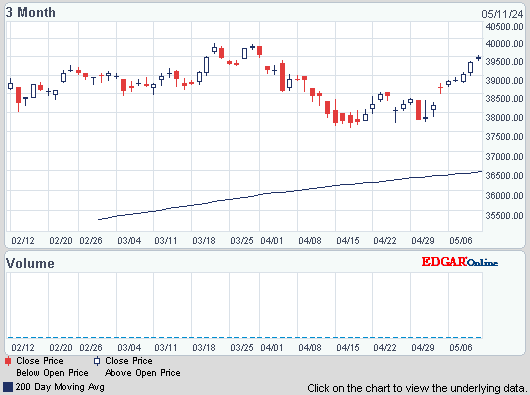Dow broke into the black going - up 18, decliners slightly ahead of advancers & NAZ rose 14. The MLP index was off fractionally in the 439s & the REIT index lost another 2 to the 263s ( down 52 from its peak earlier this year). Junk bond funds were mixed & Treasuries sold off. Oil & gold were modestly higher.
AMJ (Alerian MLP Index tracking fund)


Photo: Bloomberg
New-home construction in the US climbed in Jul, reflecting a rebound in multifamily projects that overshadowed a slowdown in single-family properties. Housing starts climbed 5.9% to an 896K annualized rate from a revised 846K pace in Jun (higher than previously reported), according to the Commerce Dept. The estimate called for a 900K rate. Multifamily construction surged 26%, while work began on 2.2% fewer single-family homes. Builders may be limiting supply amid a shortage of lots & materials as they try to boost prices & revenue in an industry that has supported growth. Further gains in employment will be needed to help sustain demand and make up for the jump in interest rates that is hurting affordability. Building permits climbed 2.7% to a 943,K annualized rate, again paced by a jump in multifamily. They were projected to rise to 945K, after a previously reported reading of 918K. Building applications for single-family projects exceeded the number of starts, signaling some scope for a pickup in construction in coming months. But construction of single family houses decreased to a 591K rate, the fewest since Nov. Work on multifamily homes, such as apartment buildings, climbed to a 305K rate. Work on these projects is often volatile, with last month’s surge following a 24.8% plunge in Jun.
Housing Starts in U.S. Rise on Multifamily Properties

Photo: Yahoo
Consumers in the US, bracing for higher interest rates & slightly slower economic growth, were a bit less optimistic in Aug as sentiment retreated from last month's 6-year high. The Thomson Reuters/University of Michigan's preliminary reading on the overall index on consumer sentiment slipped to 80.0 from 85.1 in Jul (the highest in 4 years). The Aug result was well below the 85.5 reading expected. Consumers' view of current economic conditions showed the biggest decline, & most expected the pace of growth to ease slightly. However, these changes were not large enough to upend "the prevailing view that the economic expansion will continue," survey director Richard Curtin said. "Perhaps the most important recent changes have been the increase in home values as well as the jump in the numbers that expect interest rate increases during the year ahead," he added.

Photo: Yahoo
U.S. Retailers Say Uneven Recovery Keeps Consumers Cautious
Stocks are drifting lower after the Dow has already lost 300 this week. Economic data has been so-so at best. There is selling pressure, particularly on yield sensitive stocks which have all fallen considerably in the last 3 months. The sense that the Federal Reserve will begin cutting back on its bond buying program is behind this selling in stocks. The bears are taking charge of the markets after a long period of waiting on the sidelines.
Dow Jones Industrials

AMJ (Alerian MLP Index tracking fund)
Treasury yields:
U.S. 3-month |
0.05% | |
U.S. 2-year |
0.35% | |
U.S. 10-year |
2.79% |
| CLU13.NYM | ...Crude Oil Sep 13 | ...107.25 | (0.1%) |
| GCU13.CMX | ...Gold Sep 13 | .......1,365.40 | 4.30 | (0.3%) |

Photo: Bloomberg
New-home construction in the US climbed in Jul, reflecting a rebound in multifamily projects that overshadowed a slowdown in single-family properties. Housing starts climbed 5.9% to an 896K annualized rate from a revised 846K pace in Jun (higher than previously reported), according to the Commerce Dept. The estimate called for a 900K rate. Multifamily construction surged 26%, while work began on 2.2% fewer single-family homes. Builders may be limiting supply amid a shortage of lots & materials as they try to boost prices & revenue in an industry that has supported growth. Further gains in employment will be needed to help sustain demand and make up for the jump in interest rates that is hurting affordability. Building permits climbed 2.7% to a 943,K annualized rate, again paced by a jump in multifamily. They were projected to rise to 945K, after a previously reported reading of 918K. Building applications for single-family projects exceeded the number of starts, signaling some scope for a pickup in construction in coming months. But construction of single family houses decreased to a 591K rate, the fewest since Nov. Work on multifamily homes, such as apartment buildings, climbed to a 305K rate. Work on these projects is often volatile, with last month’s surge following a 24.8% plunge in Jun.
Housing Starts in U.S. Rise on Multifamily Properties

Photo: Yahoo
Consumers in the US, bracing for higher interest rates & slightly slower economic growth, were a bit less optimistic in Aug as sentiment retreated from last month's 6-year high. The Thomson Reuters/University of Michigan's preliminary reading on the overall index on consumer sentiment slipped to 80.0 from 85.1 in Jul (the highest in 4 years). The Aug result was well below the 85.5 reading expected. Consumers' view of current economic conditions showed the biggest decline, & most expected the pace of growth to ease slightly. However, these changes were not large enough to upend "the prevailing view that the economic expansion will continue," survey director Richard Curtin said. "Perhaps the most important recent changes have been the increase in home values as well as the jump in the numbers that expect interest rate increases during the year ahead," he added.
U.S. Consumer Sentiment Weakens in August, Reuters

Photo: Yahoo
From Wal-Mart Stores (WMT) & the Gap (GPS) to Macy's (M) & McDonald's
(MCD) chains that cater to middle- & lower-income Americans say they
are feeling the pinch of an uneven economic recovery. A host of retailers have reported tepid sales lately, highlighting
the stress that consumers are feeling because of higher payroll taxes,
expensive gasoline & a slow job market 4 years after the US
economy started to rebound. For its
namesake mid-tier department stores, Macy's reported the first decline
in same-store sales in nearly 4 years this week, & said shoppers
had been gravitating to its less expensive items. That's a contrast with
Macy's upscale Bloomingdale's, which came in with strong results. The trend also turns up in results posted by WMT,
which emphasizes low pricing. Its US sales at stores open at least a
year unexpectedly fell 0.3% in Q2, a 2nd decline in a
row, prompting it to lower its sales forecast
for the year. Last week, a group of retailers, including Costco (COST) & GPS reported modest gains in Jul same-store sales, thanks largely
to bargains. Adding to the pressure, Macy's said many shoppers are redirecting their spending to their cars, housing & home improvement. Automakers reported a 14% increase for US sales in Jul from a year earlier, according to Autodata.
U.S. Retailers Say Uneven Recovery Keeps Consumers Cautious
Stocks are drifting lower after the Dow has already lost 300 this week. Economic data has been so-so at best. There is selling pressure, particularly on yield sensitive stocks which have all fallen considerably in the last 3 months. The sense that the Federal Reserve will begin cutting back on its bond buying program is behind this selling in stocks. The bears are taking charge of the markets after a long period of waiting on the sidelines.
Dow Jones Industrials










No comments:
Post a Comment